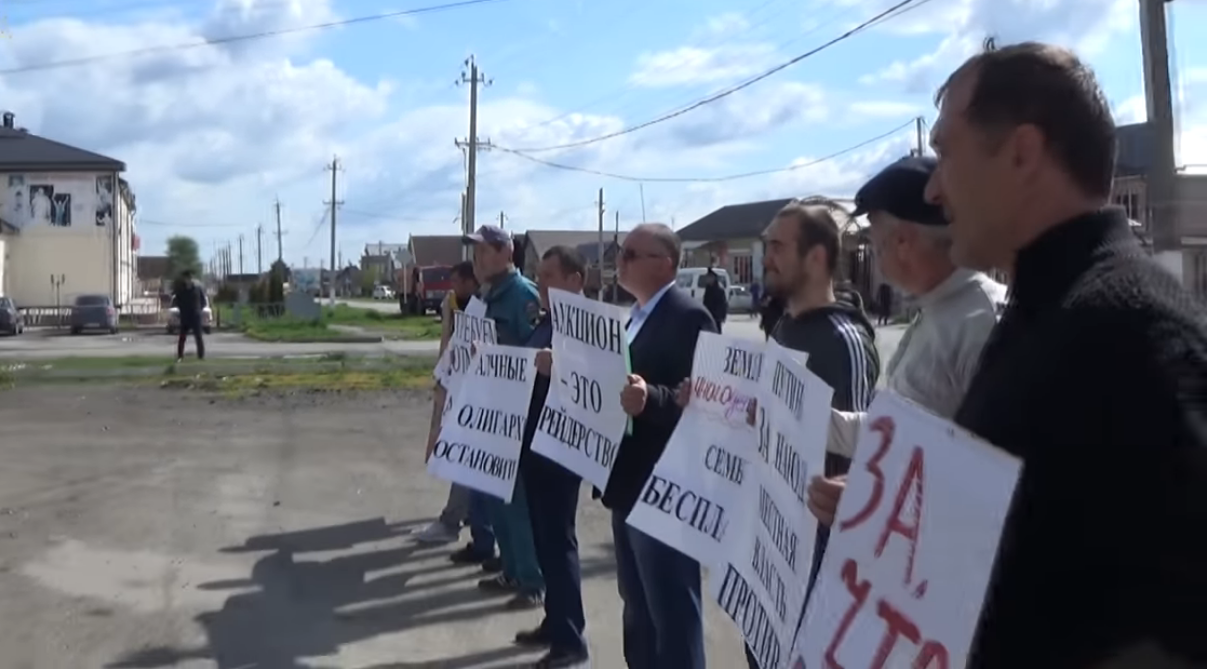

Around 50 people blocked a federal motorway in the Russian Republic of Kabardino-Balkaria on 16 March in protest against the leasing of state land to a local businessman.
Farmers blocked the road near the village of Nartan, to oppose the lease of 200 hectares of land from the Experimental Production Farm to businessman Vladimir Sekrekov. Forty hectares had already been rented to Sekrekov to be used as an apple orchard.
Zaur Kudayev, one of the protesters, told OC Media that the protest began spontaneously. ‘Someone saw the recently planted apple seedlings, reported what they saw to their neighbours, and the news quickly spread to the village’.
According to Kudayev, soon after, men began to gather around the local administration building to meet with the head of the administration of Nartan, Valery Kagov, ‘and find out the reason why this section was given to Sekrekov, while more than 1,500 Nartan people need plots of land’.
Kudayev said that the men waited for Kagov, but after he did not appear, they blocked the road with their cars. He said that after an hour, the police and state traffic officers demanded that the vehicles be removed from the motorway, and threatened the protestors with heavy fines, after which they disbursed.
OC Media reached out to the administration of Nartan and the administration of the Chegemsky District but received no response.
Local activist Rustam Dolov told OC Media that residents’ discontent intensified due to rumours that the Nartan administration leased 10 hectares of land to another person. According to Dolov, the problem lies in the fact that ‘the new tenant has already begun to build some kind of long-standing structures on this land’, while ‘this site can only be used for grazing, and there should be no construction on it’.
After the collapse of the Soviet Union and its collective farming system, land in Nartan which was once a community possession organised in a local collective farm was arbitrarily given to the newly created ‘Experimental Production Farm (OPKh) Nartan’ and declared federal property.
However, there is no documentary evidence that there was ever any reorganisation of the collective farm. In 2010, the farm declared bankruptcy with debts amounting to ₽14 million ($215,000).
‘Particularly valuable’ lands
Zhanhot Gubalov, a lawyer and specialist in the field of land relations, told OC Media that the 200 hectares are categorised as ‘particularly valuable’, and that, according to the Land Code of Kabardino-Balkaria, it is forbidden to build long-standing structures on them or ‘use them for purposes that are not maintained by their status’ — that is, the land must remain agricultural.
‘This [construction] can be done only after the transfer of these lands to the category of less valuable agricultural land, which is possible only in exceptional cases — by a decision of the government of the republic’.
According to Gubalov, the construction of such buildings without the permission of the government is a violation of the Land Code.
‘Protracted procedure’
According to Kudaev, the Nartan bankruptcy procedure has been going on for nine years, though the law states the process should only take six months, with an additional six months that can be added at the discretion of the Arbitration Court.
He said that currently, 56 farmers are leasing land from Nartan and are paying for it, but most of them do not have any documents confirming the legality of the lease. He said that they were not provided with checks or receipts in return for rent.
‘The lease agreements, of course, are not legal, as the bankruptcy trustee is not legally entitled to engage in economic activity’, he said.
Gubalov, a land lawyer, told OC Media that renting Nartan’s property ‘is not against bankruptcy law’. However, according to him, ‘in this case, the lease term should not exceed the term of bankruptcy proceedings, which is one year, taking into account possible renewals’.
Gubalov said that this is due to the fact that renting the land of a bankrupt farm makes it difficult for creditors to get money.
‘We see a gross violation of the law in terms of the period of bankruptcy proceedings — instead of the year allocated for it under the law, the Nartan bankruptcy proceedings have lasted almost 10 years. All this time, the bankruptcy trustee has received a fee for the use of land from the tenants’, Gubalov said.
‘A special approach is needed’
According to Kudayev, auctions, where only large plots of land are listed, are held for wealthy people; the average resident of Nartan, or any other village in Kabardino-Balkaria, cannot pay for plots of 100 or more hectares. According to him, the conditions of such auctions suggests a 100% prepayment arrangement, rather than a series of instalments, which is how the average resident would buy such land.
[Read more on OC Media: When the ground slips out from under the feet]
According to Gubalov, Kabardino-Balkaria is one of the smaller republics without much land, and therefore, ‘a special approach is needed here’. He said that it was necessary to revise the legal acts regulating land relations.
‘It is necessary to give farmers the opportunity to feed their family, otherwise, we will be left without agriculture, the basis of the economy of Kabardino-Balkaria’, Gubalov said.
Adam Medaliyev, a local activist, told Caucasian Knot that ‘the auction is a legalised form of raiders seizing land’. According to him, the land in Nartan must be transferred to the villagers.
In November 2018, Medaliyev was attacked outside his home, and his car was set on fire. According to Hakim Kuchmezov, chair of the local branch of the Yabloko Party, and activist Ibrahim Yaganov, the attack was organised by opponents of Medaliyev regarding the land issue.









